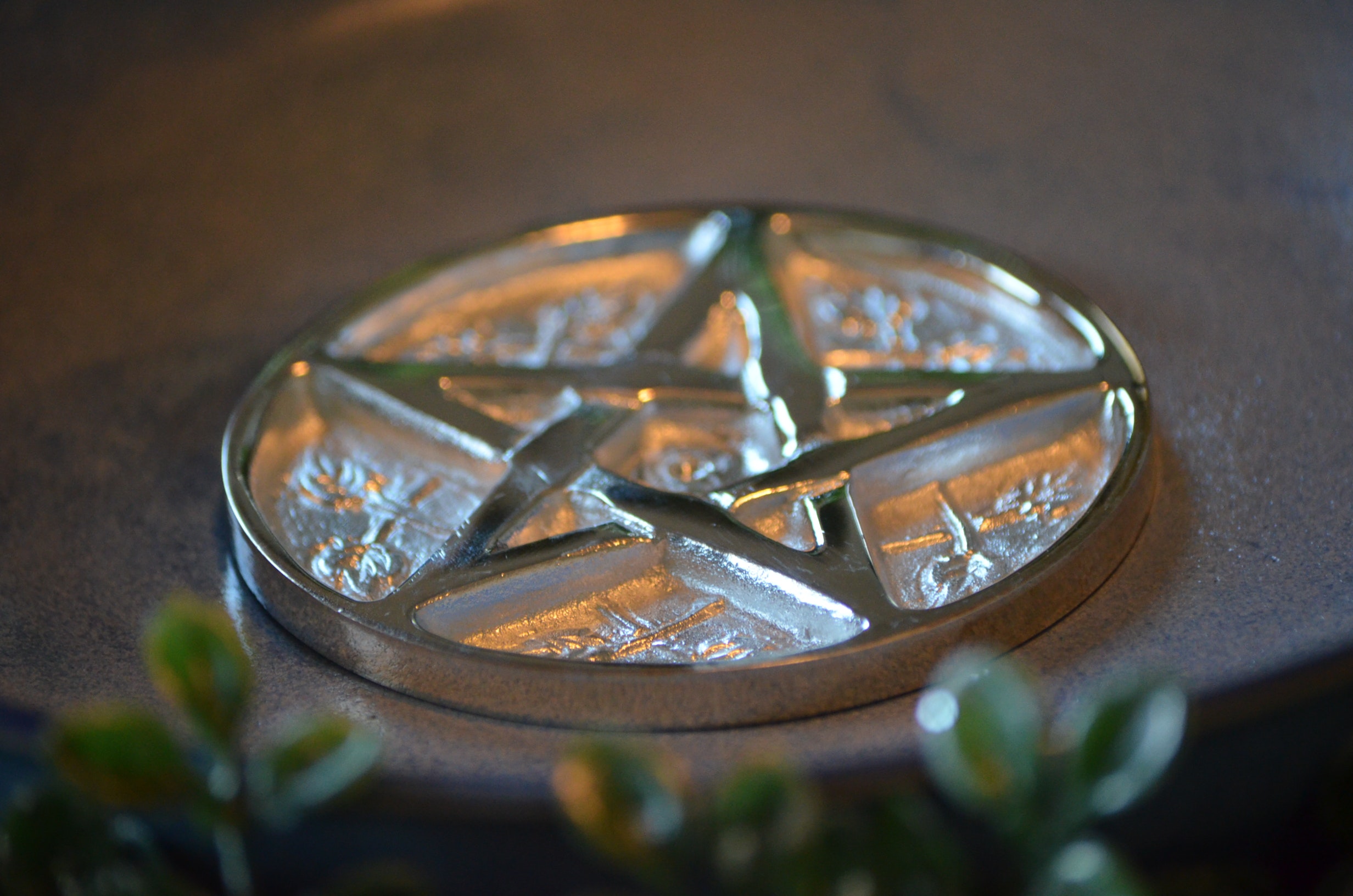I let the Harvest Moon pass by unmarked. Same with Lughnasadh. Same with a handful of other holidays. It wasn’t because it wasn’t on my calendar. It was there, taunting me with its very presence. But I didn’t have the energy or inclination to celebrate. I barely had energy to get up that morning and go to my non-physically-taxing job. Part of me blamed it on bipolar disorder and the tangible change in seasons kicking my brain chemistry into all sorts of downward gear. Part of me blamed it, rather petulantly too, on the expectation or obligation to celebrate. And part of me, some insidious dark whisperer in the back of my mind, blamed it on secret doubts about my own witchiness.
In truth, it’s probably a combination of all three. The period from October to January has never been particularly good to me in my adult life. My natural brain chemistry cycle is a combination of bipolar disorder and seasonal affective disorder. Can’t celebrate if the days are running together and you’re having trouble remembering to shower, right? And I always manage to find myself pressurized by the capitalist siren song of mundane holidays — cook the perfect food, buy the perfect gifts, don’t let them see you juggling the bills, just focus on the performance! Can’t run yourself ragged if you’re not doing anything to celebrate, right?
But what it really came down to was those doubts. Those doubts that every witch has but few seem to admit to having. When I picked up Thorn Mooney’s latest book, The Witch’s Path, I thought it might be more useful for my students who were actively working to advance their practice beyond the level of anxious beginner. Oh, was I wrong. It was like the book had been written for twenty-year veterans of the Craft who’d hit a wall in their spirituality. And it was. But it was also written for new practitioners who were timidly trying things out for the first time and for elders who couldn’t remember the way things were before they were a witch.
There’s probably a book review in here somewhere, but that’s not the focus of my essay. This essay is about taking the time to revive and renew — and taking more time than a long weekend to recuperate or a weeklong vacation somewhere away from all your problems to do so. I put myself on sabbatical until the new year, and thanks to Thorn’s book, I now have a roadmap through that sabbatical.
Getting Back to the Sacred
At some point — I don’t know exactly when — the world lost its wonder for me. Magick became this theoretical thing I taught seekers and dedicants, not a living being with whom I danced. I still flexed my magickal muscles from time to time to ensure that I could still summon the Power when I needed to, sure, but the rest of my life was decidedly unmagickal. I didn’t read. I didn’t go out into nature. I only changed my altar with the seasons because I liked to post the results on Instagram — not exactly the most spiritual reason for doing anything, but it was at least something. I did still manage Coffee with the Goddess, but not every week, and mostly for the purposes of waking up enough to teach class on Saturdays.
I want the magick back. And that’s going to take some time to do.
I’d begun the process months ago with the shedding of unnecessary expectations about myself and my Craft and honing in on those things that seemed most important to me. Working with my Gods. Working with my Ancestors. Working with my students.
Nowhere in there was there time for working on myself, and while I coasted for a while on the energy reclaimed from other projects, my summertime shedding didn’t refill my cup the way I’d expected it to. I’d stopped the draining of my cup, yes, but I hadn’t started reconnecting with that wellspring which sustains me.
Reconnecting with the Gods
My connection to my deities has taken me on a long journey where, at times, I questioned my sanity and wondered whether I was playing a game of “spiritual D&D” with myself. It’s especially difficult to work with deities who are attested to in a certain mythological canon but who lack very much to go on as far as clues to their personality or purview. Ceridwen was a lot easier to get to know than Arawn was.
It was a humbling experience to invite each of them back into my circle after such a long time of only checking in with them at a distance. I’d forgotten their power and majesty. I’d forgotten the love I have for them and the inexplicable sort of regard they have for me. But, as they were quick to remind me, I had also forgotten my oaths of service to them. I hadn’t been giving offerings. I hadn’t been speaking or acting when they directed me to do so. I hadn’t been performing ritual to experience their mysteries. And both of my gods are big on honor and small on second chances. But they aren’t unforgiving, and they do understand being without an anchor in the middle of a worldwide plague. After some discussion, I agreed to re-establish certain practices, let go of others, and wait a while before taking on more ambitious spiritual work.
Serving the Ancestors
Ancestor veneration has been a core feature of my overall practice for years. The first time I heard talk of the Mighty Dead from my elders, something pushed me in the direction of listening to these spirits and honoring them through offering and action. I built an ancestor altar to keep up year-round, collected items meaningful to the different lineages of ancestors that I worked with, and learned skills for communicating with them.
Over time, and especially after my teacher Susan’s death, I got lackadaisical about keeping that altar clean and freshly adorned and gave offerings less and less often until I wasn’t giving them at all. Grief is a funny thing. I thought I’d have a stronger connection to the ancestors when she died, and to be fair, it did unlock some new ancestors to work with. But instead of dealing with my grief, I shunted it to the side “to deal with later” and then never dealt with it.
So when I invited the ancestors to come to my circle, it was a little bit like getting a well-earned lecture from your parents. The spirits that had once felt so familiar to me seemed unfamiliar — but that unfamiliarity gave me the opportunity to get to know each of them once more. Again, I agreed to re-establish certain practices, let go of others, and wait for their approval before taking on more ambitious operations. Even more than with my gods, I felt like the ancestors were stressing foundational matters — connection to the spirit world, attention to subtle signs, and commitment to a certain path.
Closing Chapters of Practice
One of the spiritual housekeeping tasks recommended by Thorn in her book involved cleaning house — reordering my altars to be sacred space instead of art installations and going through old mementos from my practice, as well as half-burned candles for long-forgotten spells, expired apothecary items, and a small temple’s worth of ritual supplies that no longer called to me. Some of those things went straight to the trash, as they were long overdue for a return to the earth. Other things went into a box to circulate among my community, as they had sentimental value. But the thing I dreaded was going upstairs and taking down a personal altar that had been neglected for longer than I can remember.
I have to admit to feeling a big sense of failure as I took those objects off the top of the bookcase, decommissioned them, and put them into a box. On one hand, I felt like I hadn’t put in the work necessary to keep the space empowered; indeed, I realized I had held onto the altar out of a sense of nostalgia and hiraeth. I had to remind myself that I had been working and teaching in an entirely different tradition and paradigm for longer than I’d been working in the Sisterhood of Avalon, and that the parting of ways was not unexpected even if it had gone unacknowledged.
I learned a great deal from the women of the SOA and from the writings of its founder and Morgen, Jhenah Telyndru. In a lot of ways, as a much younger practitioner, I modeled my benchmarks of success after hers — an advanced academic degree, a thriving tradition, published books. It was a difficult realization to wrestle with that her path would never be mine, even though we might walk adjacent trails in the Otherworld. Saying goodbye to that tradition was bittersweet. On one hand, I was sad. On the other, I was glad to know that the tradition I’d been initiated into and worked through to the third degree in was demonstrably the right path for me.
Onward into the Dark
Right now, I’m taking time to plan my next steps. I know a lot of it will be introspective in nature, addressing those doubts I wrote about earlier and re-engaging with the living, breathing magick of the Cosmos. I have a few ideas about how I’ll do that: resuming weekly Coffee with the Goddess, getting back to my daily prayer practice, leaving regular offerings. But I’m taking it slow. The surefire way to set yourself up for failure, after all, is to launch The Perfect Witchy Practice™ all at once. As we head into the dark half of the year, I’m sure my own personal cycles will dictate the pace at which I add new elements to my practice. But I am putting one metaphorical foot in front of the other. The only way forward is forward.

